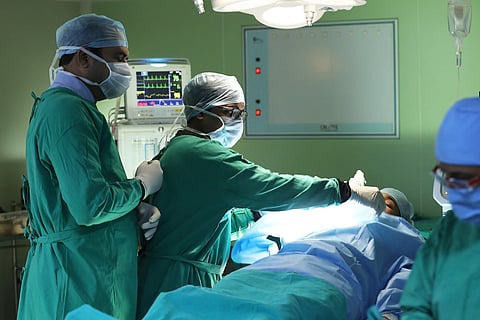

COVID-19 does not seem to have affected the number of organ donors in Kerala who donated their organs after death. From January till October this year, 61 life-saving transplant surgeries were done in the state amid the pandemic, thanks to 18 deceased donors and their families who signed up to save lives. This number is comparable to that in 2019, when the state reported 19 deceased organ donors and 55 transplant surgeries.
The state has, however, seen a steep decline in live donor transplant surgeries this year due to a steady increase in COVID-19 cases and associated concerns. Live kidney donations fell by more than half in 2020 and currently stands at 307, as compared to 609 kidney transplant surgeries done in 2019. Live liver transplants have also taken a hit with just 56 transplant procedures performed in 2020. In 2019, the state reported 133 live liver transplants, says Dr Noble Gracious, state nodal officer of Kerala Network for Organ Sharing (KNOS).
There are many reasons for this noticeable dip. The spread of COVID-19 in the state has posed severe challenges for patients needing organ transplants, both in terms of health and the rising cost of surgery.
“An organ transplant patient has to take anti-rejection medication or immunosuppressants so that their body does not reject the newly transplanted organ. This medication has to be taken for life, and what it does is reduce the patient’s immunity. An immunosuppressed person is more susceptible to infections like COVID-19. This is a major concern for patients and might be a reason for a lesser number of people opting for transplants,” says Dr Noble.
For an organ transplant during the pandemic, both donors and recipients need to go through multiple COVID-19 tests. An antigen test is done to check for viral antigens. If the antigen test is negative, the patient and donor are admitted. However, organ transplant surgery is performed only if both the donor and the recipient test negative for coronavirus in the RT-PCR test. An RT-PCR test detects viral particles in the patient’s body by testing their nasal or throat swab.
“For a person who has recovered from COVID-19, it might take a few months for the RT-PCR test to return negative, as the test detects viral particles that might stay in the body even after the patient has recovered,” explains Dr Noble. This means that if a patient who needs a transplant contracts coronavirus, their surgery may be delayed by as many as six months. Even after a transplant, these patients are susceptible to COVID-19 reinfection as they are now immunosuppressed.
It is not just the donor and recipient, but COVID-19 tests have to be performed on the team of doctors, nurses, cleaning staff as well the ICU staff who interact with the patient. Patients also have to be admitted 2-3 weeks before the procedure to avoid infection, thus adding to hospital costs.
“Earlier, transplant surgery costs varied between Rs 4 lakh and Rs 8 lakh. However, during the pandemic, this cost would have definitely spiked as private hospitals have been admitting patients weeks before the surgery,” Dr Noble adds.
Transplant surgeries with organs from deceased donors present other challenges. “For instance, the medical team transporting an organ from one hospital to another needs to test negative. The deceased donor will also be tested for the virus. Until the test result comes in and the organs are harvested, the body cannot be handed over to the family. This results in delay in handing over the body,” says another official from KNOS.
With the lockdown lifted and traffic back on the roads, transporting an organ from one district to another poses logistical problems.
“In the early days of lockdown, we were able to quickly transport organs as there was no traffic on the roads. An organ, especially the heart, has to be transplanted within 4 hours of harvesting to be effective. We usually transport the organ via air. In 2020, two heart transplants were performed in Kerala after the organs were flown from a Thiruvananthapuram hospital to a Kochi hospital with the help of district collectors, police officials, and other state departments. But now, we’ll need to take measures to create a Green Corridor on our roads,” the official adds.
A Green Corridor is a “demarcated, cleared out special road route created for an ambulance that enables harvested organ(s) meant for transplant”.
The pandemic has made it difficult for patients to easily access hospitals. For instance, a transplant patient from a COVID-19 containment zone cannot visit any hospital. They will be taken to a separate demarcated space along with anyone accompanying the patient. They will then be tested for the virus before admission to the hospital. Staff shortage is also cited as a challenge when it comes to surgeries, as many private hospitals have cut down on workforce to reduce risk of exposure to the virus.